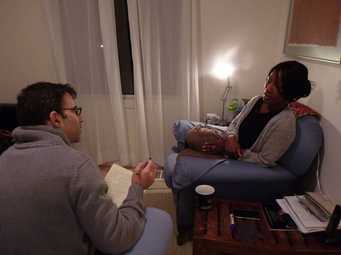But who were we kidding? As Carlos himself mentioned in his article, there was lot of back and forth feedback -- a sort of Geertzian dance of mutual interpretations. Carlos’ essay demonstrates how a good, effective anthropologist can be both distant and empathetic in writing about the most intimate and complicated details of human experiences. What Carlos made of my thoughts, claims and experiences is his own self-conscious interpretation – but an interpretation fully informed by hours of conversations on my life and family, my initiation in Sierra Leone, my intimate relationships and sexuality from my multiple and sometimes conflicting perspectives as an American and a Kono woman, a practicing Christian who also values my Muslim heritage and Kono ancestral tradition. When I reread Carlos’ essay after it was published - putting aside the more abstract or theoretical discussions on morality - I can honestly say “he nailed it”. What would anthropology look like if all academic publishers were to require that all ethnographic publications be reviewed by our research subjects or key informants (who in this utopia would all have advanced degrees) and the latter’s comments be published alongside the main essay? Heck, what would feminism look like if the perspectives of all women – the researcher and the researched - were included as equally or mutually authoritative in our formal discourses and publications on sex, gender, power and equality? What started out on my part as an exercise in surrender and vulnerability turned out to be a tremendously empowering and validating process of mutual understanding and interpretation between myself and Carlos – two very different persons who are eachother's intellectual equals. Below I've copied my response to Fuambai's Strength. You can click here to read Carlos' full essay. My Respone to Fuambai's Strength 2016 HAU: Journal of Ethnographic Theory 6 (3): 135–137 I am incredibly intrigued and humbled that Carlos David Londoño Sulkin chose to focus one of three bioethnographic case studies concerning the anthropology of morality on me, my life, and my work. In his very illuminating essay, Carlos underscored what he saw as my strength, or rather my own desire to be a strong African woman. Before reading his article, I would have vehemently denied that I was the least bit a reflection of yet another stereotype of a strong African or black woman. However, Carlos is very much accurate in defining my view of the strength of Kono women—from my mother, aunts, and grandmothers to the Bondo women’s secret society in Sierra Leone—as “savvy resourcefulness” and noting my admiration of such a pragmatic, utilitarian approach to getting one’s way in the world. So, if this is the sense in which Carlos refers to the “kind of strong African woman she aspired to be” then he is correct. Strength in this sense, the sense in which I value and identify with Kono women is not some static, romantic characterization of the stoic African mother but a force that is performed, situational, fluid, strategically deployed or wasted. Strength is less a permanent character trait than an effective resource utilized by intentional women in seeking to advance their own everyday agendas. Bondo women are not to be romanticized or underestimated by Western observers; its ruling elite women are a law unto themselves, a veritable militia, and will resort to violence to protect their interests and women’s spheres of power. I have not seen or read of anything like these modern Amazons, so yes, I am immensely seduced by their strength and power. Perhaps this concept of strength could be more explicitly contrasted with my (admittedly generalized) view of Western conceptions of strength as it relates to power and gender. In Western society, for the most part, women can be described as strong but men are powerful. I often hear that such-and-such woman is a “strong” woman but I never hear a man described as a “strong” man unless the reference is to his physical build and endurance. But I do hear a lot about this or that “powerful” man and much, much less so about a “powerful” woman. Too often the Western use of power is something akin to masculinity, a quality that a woman is not supposed to have. If a woman goes after what she wants, stands her ground, and takes no prisoners along the way, she’s exuding a manlike quality. So, for instance, while many in the United States where I reside can relate to a “strong” woman—a woman who endures great pain, tremendous adversities, and is expected to be the emotional pillar of her family and community—these same individuals would be very much uncomfortable with the notion of a “powerful” woman, one who is not only strong but a powerbroker, decision maker, wheeler-dealer. For most Kono, women are seen as both innately strong and empowered. Women are powerbrokers, decision makers, and wheelers-dealers of society as women. They have their own spheres of power and influence and zealously guard these. There are important checks and balances between the male and female domains. My challenge—and obsession really—has been to explain to an outside world what strength and power look like for women when these have little to do with competing for material resources or socioeconomic status or the exercise of economic and political influence at the national level. How can I bring Western women to understand that for the Kono, molding inner strength for the deployment and enjoyment of female power is the very purpose of initiation and central to the definition of womanhood? Carlos was apt to note that my defense of Bondo is not on cultural relativist grounds—though I am very sympathetic to the basic tenets of this philosophy—but as a result of my American upbringing and fiercely liberal views on the rights of the individual to equality, dignity, and self-determination that are enshrined in the US Constitution and Universal Declaration of Human Rights. My current activism in Africa and the United States is based on the principle that all humans are created equal and there is no reason to single out the bodily practices of weaker or marginalized groups as inherently harmful while people in dominant societies uphold identical bodily practices. Further, I believe passionately that all individuals have a basic, fundamental right to their own bodies and to make whatever decision they deem fit for their well-being or contentment. Any decision as to whether societies ought to allow parental or group rights to trump individual rights in the case of female (or male circumcision) should be consistently applied across all groups and individuals. Carlos is also correct that my engagement with this controversial topic is more than just identification with my traditional African and liberal American roots but an experience of a higher calling. I found this to be the most difficult and deeply personal part of our conversation; I hesitated to share but would have felt dishonest if I had not gone there. Nonetheless, I don’t feel removed enough or especially compelled to elaborate on his brief analysis of the nature and role of the multiple religious influences that motivate me—I am trying to understand these myself. It was a very personal admission in an open-ended interview with my full knowledge that Carlos, as a one of the finest anthropologists I know, would make of this what he felt made sense of any patterns in my thoughts, beliefs, actions, and writings. Studying female initiation and circumcision has been a spiritual calling, a process of self-discovery, a serious scholarly inquiry, and a struggle for the rights of individual women and groups of women to own their bodies and cultural identities. No other experience in my life brings together such deep intellectual passion combined with firsthand experience and knowledge as well as an opportunity to live out and test every dimension of my faith. Fuambai Sia Ahmadu is a Sierra Leonean-American scholar and activist. She is the cofounder of All Women are Free to Choose Inc., a US-based nonprofit organization, to advance inter- and intragender equality of circumcised women worldwide. Fuambai received her doctorate in social anthropology at the London School of Economics. She worked in The Gambia as a lead consultant with UNICEF and as a Principal Investigator at the British Medical Research Council. Fuambai was a recipient of the NIMH postdoctoral fellowship at the University of Chicago and pursued further training at the NICHD in Rockville, Maryland. Fuambai was awarded a Carley-Hunt writing grant and worked in residence at the Office of the Vice President of the Republic of Sierra Leone as a senior research fellow and health advisor. Fuambai is Editor in-Chief of SiA Magazine a new quarterly publication for the empowerment of circumcised women globally. Fuambai Sia Ahmadu, PhD
Executive Director, AWAFC Inc. 9912 Edward Ave Bethesda, MD 20814 240.506.2103 [email protected] www.fuambaisiaahmadu.com
0 Comments
Your comment will be posted after it is approved.
Leave a Reply. |
Archives
March 2024
Categories
All
|


 RSS Feed
RSS Feed